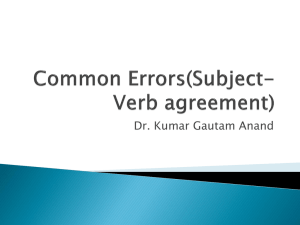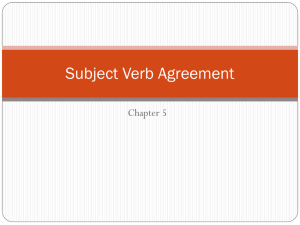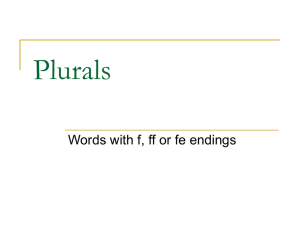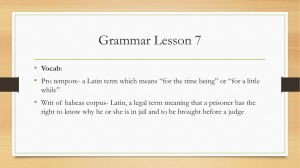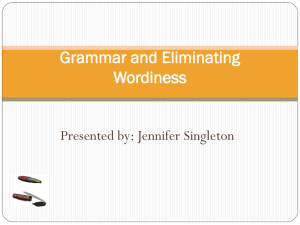Unit 16 Power Point
advertisement
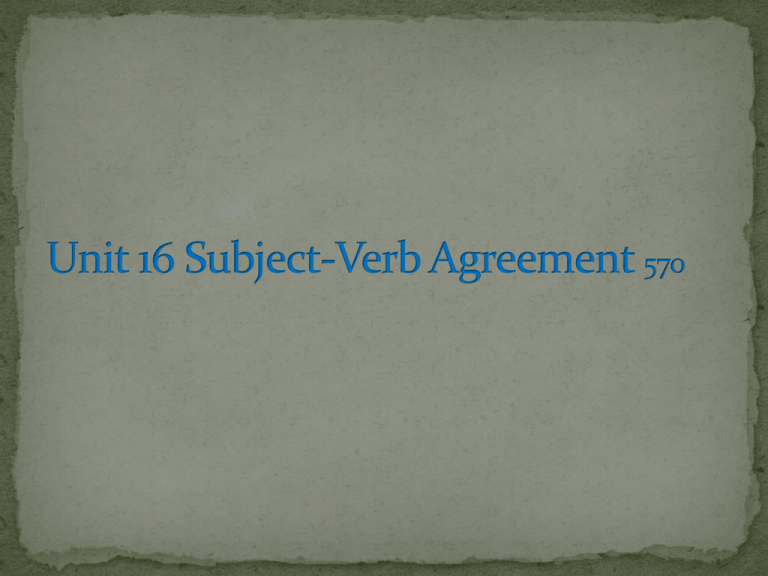
A verb must agree with its subject in number (singular/plural) and person. A singular subject takes a singular verb. A plural subject takes a plural verb. With most verbs the only change in form to indicate agreement in person occurs in the present tense. An –s (or –es) is added to the base form of the verb when its subject is third-person singular. For example: Singular Plural She speaks. They speak. He exercises. They exercise. She pitches. They pitch. The linking verb be changes in both the present and the past tense. For Example: Singular Plural He is there. They are there. It was sweet. They were sweet. In verb phrases the auxiliary verbs be, have, and do change in form to show agreement with third-person subjects. Singular Plural He is going. They are going. She is reading. They are reading. She has seen a movie. They have seen a movie. Does he stay here? Do they stay here? Do not mistake a word in a prepositional phrase for the subject of a sentence. The simple subject is never within a prepositional phrase. Make sure the verb agrees with the actual subject and not with the object of a preposition. For example: The taste of cherries surprises us. [the subject taste is singular; of the cherries is a prepositional phrase; therefore, the verb surprises is singular.] The spices in the food are interesting. [subject spices is plural; in the food is a prep. phrase; therefore, the verb are is plural. Do not be confused by a predicate nominative(renames subject) that is different in number from the subject. Only the subject affects the number of the linking verb. The lightest crate is two tons. [tons is the P.N.] Recent studies on the behavior of wild animals are his topic for the day. [subject=studies, verb=are] In an inverted sentence—a sentence in which the subject follows the verb--- take care in locating the simple subject, and make sure that the verb agrees with the subject. Inverted sentences often begin with prepositional phrases. Do not mistake the object of the preposition for the subject. Singular: In the jungle roars the lion. Plural: In the jungle roar the lions. Singular: In a large cage at the zoo rests a noble lion. Plural: In a large cage at the zoo rest two noble lions. In inverted sentences beginning with there or here, look for the subject after the verb. The words there or here is almost never the subject of a sentence. Singular: There is a lion in the jungle. [is=verb, lion=subject] Here goes the ambulance. [goes=verb, ambulance=subject] Plural: There are the lions in the jungle. Here goes the two ambulances. In questions an auxiliary verb may come before the subject. Look for the subject between the auxiliary verb and the main verb. Singular Does that lion live in the jungle? Plural Do those jungles contain lions? Collective Nouns A collective noun names a group. Consider a collective noun singular when it refers to a group as a whole. Consider a collective noun plural when it refers to each member of a group individually. Singular- His family arrives. Plural- His family are well. Singular- The committee decides. Plural- The committee sign their names. Certain nouns that end in –s, such as mumps, measles, and mathematics, take singular verbs. Singular- Mumps is a disease. Certain other nouns that end in –s, such as scissors, pants, binoculars and eyeglasses, take plural verbs. The scissors were sharp. Your eyeglasses need cleaning. Many nouns that end in –ics may be singular or plural depending upon their meaning. Statistics is an interesting subject. Statistics how that women live longer than men. When a noun of amount refers to a total that is considered as one unit, it is singular. When it refers to a number of individual units, it is plural. Singular- Three dollars is not too much for that book. Plural- Three dollars are on the table. Singular- Ten years is a decade. Plural- Ten years have passed. Titles A title is always singular, even if a noun within the title is plural. Great Expectations is a well loved novel in literature. A compound subject that is joined by and or both…and is plural unless its parts belong to one unit or they both refer to the same person or thing. The lion and the tiger are roaring. [plural] Both skiing and skating are fun. [plural] Peanut butter and jelly is a favorite combination. [singular] Compound subjects joined by Or or Nor (or either…or or neither…nor), the verb always agrees with the subject nearer the verb. Plural- Neither the lion nor the tigers are roaring. Singular- Either the lion or the tiger is roaring. A verb must agree in number with an indefinite pronoun subject. Indefinite pronouns can be divided into three groups, as shown in the following chart: Always Singular Each, either, neither, one Everyone Everybody Everything No one Nobody Nothing Anyone anybody Anything Someone Somebody something Always plural Several Few Both Many Singular or plural Some All Any Most None Plural indefinite pronouns take plural verbs. Singular indefinite pronouns take singular verbs. Singular- Everybody is going to the beach. Plural – Both of the children are in school today. A pronoun from the group labeled singular or plural can be either singular or plural, depending upon the noun to which it refers. Singular- Some of the pie is left. Plural- Some of the commuters were caught in the storm.


